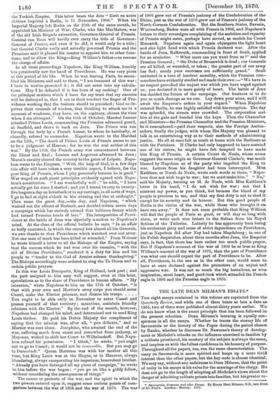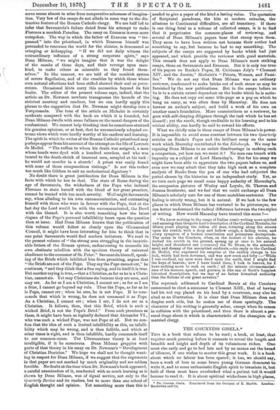THE LATE DEAN MILMAN'S ESSAYS.*
THE eight essays contained in this volume are reprinted from the Quarterly Review, and while one of them bears as late a date as. 1865, two of them were published almost thirty years earlier. We do not know what is the exact principle that has been followed in the present selection. Dean Milman's learning is equally con- spicuous in all the essays. Whether he traces the stormy life of Savonarola or the history of the Popes during the period chosen by Ranke, whether he discusses Dr. Newman's theory of develop.. ment or Michelet's attacks on the influence exercised in families by a celibate priesthood, his mastery of the subject is always the same, and inspires us with the fullest confidence in his honesty of purpose.. Throughout all the papers, too, run the same characteristics. The essay on Savonarola is more spirited and keeps up a more vivid interest than the other papers, but the key-note is almost identical. We may say, without any unfairness to Dean Milman, that the point of unity in his essays is his value for the marriage of the clergy. He does not go to the length of adopting all Michelet's views about the danger of admitting celibate priests into families, but his greater re-
• Savonanga, Erasmus, and other Essays. By Henry Hart Milman, D.D., late Dean of El t. Paul's. London : Murray. 1870.
serve seems almost to arise from comparative soberness of imagina- tion. Very few of the essays do not allude in some way to the dis- tinctive feature of the Roman Catholic clergy. We are half led to infer that Savonarola's failure dated from his attempt to make Florence a monkish Paradise. The essay on Erasmus is even more outspoken. The way in which the father of Erasmus was " tre- panned" into the priesthood, in which Erasmus himself was persuaded to renounce the world for the cloister, is denounced as crimping or kidnapping. " If we did not daily witness the extraordinary influence of a strong corporate spirit," says Dean Milman, " we might imagine that it was the delight of the monks of those days, and their revenge upon man- kind, to make others as miserable as they found them- selves." In like manner, we are told of the monkish system of severe flagellation, and of the cruelties by which those whose own natural affections had been stifled showed their zeal as perse- cutors. Occasional hints carry this accusation beyond its fair limits. The editor of the present volume says, indeed, that the article on Dr. Newman nowhere transgresses the bounds of the strictest courtesy and candour, but we can hardly apply this phrase to the suggestion that Dr. Newman might develop into a Torquemada. The tone of the article on Michelet is certainly moderate compared with the book on which it is founded, but Dean Milman dwells with some fullness on the moral dangers of the confessional. We cannot help thinking that he sometimes strained his genuine opinions, or at best, that he unconsciously adopted ex- treme views which were hardly worthy of his candour and learning. The spirit in which he writes of the Roman Catholic priesthood may perhaps appear from his account of the attempt on the life of Lorenzo de Medici. " The ruffian to whom his death was assigned, a man whose hands were dyed with a hundred murders, and who was inured to the death-shriek of innocent men, scrupled at his task : he would not murder in a church I A priest was easily found with none of those compunctious visitings." Is not this rather too much like Gibbon to suit an ecclesiastical dignitary?
No doubt there is great justification for Dean Milman in the facts with which he has to deal. The state of Rome during the age of Savonarola, the wickedness of the Pope who induced Florence to stain herself with the blood of her great preacher, cannot be treated with too much severity. Well might Savonarola say, when alluding to his own excommunication, and contrasting himself with those who were in favour with the Pope, that at the last day the Lord would be with the excommunicated, the Devil with the blessed. It is also worth remarking how the latest dogma of the Pope's personal infallibility bears upon the question then at issue. Had Dean Milman known that the publication of this volume would follow so closely upon the (Ecumenical Council, it might have been interesting for him to think that in one point Savonarola would find modern imitators. We read in the present volume of " the strong man struggling in the inextric- able fetters of the Roman system, endeavouring to reconcile his own obstinate rebellion with the specious theory of universal obedience to the successor of St. Peter." Savonarola himself, speak- ing of the Briefs which inhibited him from preaching, argues that " the Briefs are not of the Pope. They say the Pope cannot err," he continues, " and they think that a fine saying, and in itself it is true. But another saying is true,—that a Christian, as far as he is a Chris- tian, cannot sin. Yet may Christians sin because they are men, and may err. As far as I am a Christian, I cannot err ; as far as I am a friar, I cannot go beyond my rule. Thus the Pope, as far as he is Pope, cannot err ; when he errs, he is not Pope. If he com- mands that which is wrong, he does not command it as Pope. As a Christian, I cannot err ; when I err, I do not err as a Christian. It follows, then, that this Brief, which is such a wicked Brief, is not the Pope's Brief." From such premissea as these, it might have been as logically deduced that Alexander VI., who was such a wicked Pope, was not Pope at all. But we con- fess that the idea of such a limited infallibility as this, an infalli- bility which may. be wrong, and is then fallible, and which at other times is right, and is then infallible, hardly commends itself to our common-sense. The Ultramontane theory is at least intelligible, if it be monstrous. Dean Milman grapples with parts of that theory in his essay on Dr. Newman's " Development of Christian Doctrine." We hope we shall not be thought want- ing in respect for Dean Inman, if we suggest that the arguments in that paper are not marked by much originality and are seldom forcible. No doubt at the time when Dr. Newman's book appeared, a careful examination of it, conducted with so much learning as is shown by Dean Milman, was of signal service, not only to the
Quarterly Review and its readers, but to more than one school of English thought and opinion. Yet something more than this is
needed to give a paper of the kind a lasting value. The quotation of Scriptural paradoxes, the hits at modern miracles, the allusions to Continental difficulties, are all transitory. If there is one thing fatal to a volume of collected essays, it is to find that it perpetuates the common-places of reviewing, and several of Dean Milman's papers bear that stamp upon them. They seem to have been written not because their author had something to say, but because he had to say something. The subjects of the essays are suggested by books which had just appeared, and which provide the reviewer with good materials. This remark does not apply to Dean Milman's most striking essays, those on Savonarola and Erasmus. But it is only too true of his papers on Ranke's Popes, M. Cratineau Joly's " Clement XIV. and the Jesuits," Michelet's " Priests, Women, and Fami- lies." We do not say that Dean Milman was an ordinary reviewer, condemned to make bricks out of such straw as may be furnished by the new publications. But in the essays before un he is to a certain extent dependent on the books which he is notic- ing. He does not copy out some title-page as a peg on which to hang an essay, as was often done by Macaulay. He does not borrow an author's subject, and build a work of his own on another man's foundation. More conscientious as a reviewer, he goes with self-denying diligence through the task which he has set himself ; yet the result, though creditable to his learning and to his critical ability, can hardly be said to reward his efforts.
What we chiefly miss in these essays of Dean Milman's is power.. It is impossible to avoid some contrast between his two Quarterly articles on Ranke's Popes and the brilliant essay on the same work which Macaulay contributed to the Edinburgh. We may be exposing Dean Milman to an unfair disadvantage in making such a comparison, yet how can we resist it ? No man can trench with impunity on a subject of Lord Macaulay's. But for his essay we- might have been able to appreciate the two papers before us, and even now we may admit that they take high rank as a complete analysis of Ranke from the pen of one who had subjected the period chosen by the historian to an independent study. Yet, as- we turn each page we recall some happy audacity of Macaulay's, the companion pictures of Wesley and Loyola, St. Theresa and Joanna Southcote, and we feel that we could exchange all Dean Milman's scholarly care for one of those matchless sentences. The- feeling is utterly wrong, but it is natural. If we look to the few places in which Dean Milman has ventured to be picturesque, we can better understand the radical difference between the two styles of writing. Row would Macaulay have treated this scene?— "We know nothing in the range of Italian comic writing more spirited and amusing than Gregorio Leti's description of the Cardinal Montalto, for fifteen years playing the infirm old man, tottering along the streets upon his crutch, with a deep and hollow cough, a failing voice, and every symptom of a broken constitution and premature decrepitude.. The scene in the Conclave, -when, on the instant of his election, be dashed his crutch to the ground, sprang up at once to his natural height, and thundered out (entonava) the Te Deum, to the astonish- ment and dismay of the assembled cardinals,—his reply to the Cardinal de Medici, who expressed his surprise at the sadden change in his look, which had been downcast, and was now erect and lofty While I was cardinal, my eyes were fixed upon the earth, that I might find the keys of heaven ; now I have found them, I look to heaven, for I have nothing more to seek on earth ;' all the minute circumstantial- ness of his manner, speech, and gesture, is like one of Scott's happiest• historical descriptions, but we fear of no better historical authority than the fictions of our great novelist."
The reproach addressed to Cardinal Bemis at the Conclave summoned to elect a successor to Clement XIII., that of having had his red cap placed on his head by a courtesan, may also be cited as an illustration. It is clear that Dean Milman does not despise such aids, but he makes use of them sparingly. The character of his writing is generally sober, except when he comea in collision with the priesthood, and then there is almost a per- sonal tinge about it which is characteristic of the champion of a married clergy.



































 Previous page
Previous page